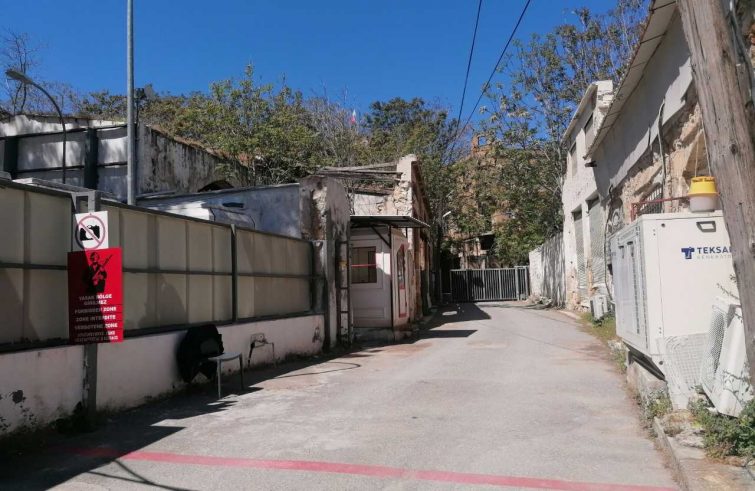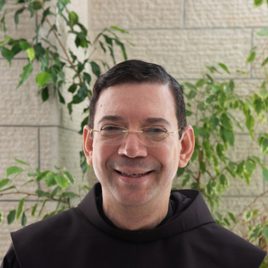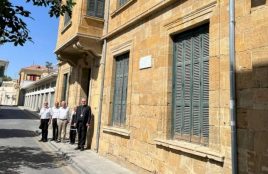
Cyprus, the land of Saint Barnabas, who brought the message of Christ’s Resurrection, also the land of Lazarus, the resurrected “Friend of Christ”, of Saint Paul and of the first Christians. Cyprus, the third largest island in the Mediterranean (after Sicily and Sardinia), encompasses manifold contradictions. It was divided in two after the Turkish invasion, marked by stalled peace talks despite the efforts of all religious leaders. Nicosia is the last European capital that is still divided in two by a wall, known as the Green Line that stretches 180 km, separating South Cyprus – recognised by the international community- and North Cyprus, backed by the Turkish government.
A crossroads of many continents, whose shores are gateways to Europe and the Middle East, Lebanon, Syria. The Symposium ‘Rooted in Hope’, promoted by R.O.A.C.O. (Assembly of Organizations for Aid to the Oriental Churches), took place in Nicosia (Cyprus) on April 20-23. The event marked the 10th anniversary of the Post-Synodal Apostolic Exhortation ‘Ecclesia in Medio Oriente’ signed by Benedict XVI in Harissa (Lebanon) on September 14, 2012. The initiative brought together more than 250 delegates of the Catholic Churches in the Middle East, including patriarchs, bishops, priests and representatives of religious institutes and lay movements. It was the occasion to rediscover the thousand-year-old presence of Latin Catholics on the island, who belong to the patriarchal diocese of Jerusalem, as the Latin Patriarchal Vicar, Father Bruno Varriano, explained to SIR: “The Latin community in Cyprus is a respected community today, recognised by the State. It forms an integrating part of the national community within a mainly Greek society as testified, inter alia, by the heritage of faith and history bequeathed to the Cypriot people. The Cypriot government’s initiative to provide financial support to both the Orthodox and Catholic clergy, and the presence of Christian representatives elected by their respective communities – Latins, Maronites, and Armenians – in the island’s top political institutions, is but evidence of this.
 Father Bruno is a Franciscan religious of the Custody of the Holy Land. He was appointed Vicar in Cyprus in December last year, when, at the behest of the Latin Patriarch of Jerusalem, Pierbattista Pizzaballa, the new official seat of the Vicariate was inaugurated in Nicosia. “It was an intuition of our Patriarch – says Father Varriano – meant to strengthen the presence of the Latin Catholic Church and to address the ongoing religious developments, the various political issues and the increasingly serious social emergencies. The Cypriot communities now have their own shepherd and a home.” The vicar can count on the support of 15 Latin priests, “but soon there will be 16 of us: we are expecting a priest from Sri Lanka who will accompany these believers, now the second largest community after the Filipinos. We are also expecting the arrival of a French speaking priest, to accompany the migrants from French-speaking African countries.” There are four parishes in Cyprus: the Patriarchate runs St Paul’s parish church in Paphos, while the other three, St Catherine’s, St Mary of Grace and the church of the Holy Cross, are run by the Franciscans. Holy Mass is celebrated not only in the capital, but also in Limassol, Larnaka and Pafos, towns that are home to a dozen Latin churches and chapels.
Father Bruno is a Franciscan religious of the Custody of the Holy Land. He was appointed Vicar in Cyprus in December last year, when, at the behest of the Latin Patriarch of Jerusalem, Pierbattista Pizzaballa, the new official seat of the Vicariate was inaugurated in Nicosia. “It was an intuition of our Patriarch – says Father Varriano – meant to strengthen the presence of the Latin Catholic Church and to address the ongoing religious developments, the various political issues and the increasingly serious social emergencies. The Cypriot communities now have their own shepherd and a home.” The vicar can count on the support of 15 Latin priests, “but soon there will be 16 of us: we are expecting a priest from Sri Lanka who will accompany these believers, now the second largest community after the Filipinos. We are also expecting the arrival of a French speaking priest, to accompany the migrants from French-speaking African countries.” There are four parishes in Cyprus: the Patriarchate runs St Paul’s parish church in Paphos, while the other three, St Catherine’s, St Mary of Grace and the church of the Holy Cross, are run by the Franciscans. Holy Mass is celebrated not only in the capital, but also in Limassol, Larnaka and Pafos, towns that are home to a dozen Latin churches and chapels.
The challenge of the wall… United with the mother church in Jerusalem, Cyprus shares the ‘separation wall’ with the holy city. In fact, Jerusalem and Nicosia are both divided by a barrier that separates Israelis and Palestinians in Jerusalem, and Greeks and Turks in Nicosia. “As Christians and as Catholics we are called to be instruments of peace here on the island”, Father Varriano pointed out. We don’t see the wall as a limitation. We have four communities in the north, in the area occupied by the Turks, one in Nicosia after the Turkish checkpoint, one in Kyrenia and one in Famagusta, where there is also another community, a small one, consisting of students. I celebrated Easter in Nicosia with over 500 faithful, including Africans. There are many Filipinos and believers with other nationalities in Kyrenia, who congregate in a small church. In other areas, since there are no churches to celebrate in, church services are held in abandoned movie theatres or garages. This is the reality we live in and we don’t see it as a limitation. As Church we want to be as close as possible to the faithful.” The Latins are not alone in this mission: “Religious Track, an initiative established under the auspices of the Swedish embassy, is actively engaged on the island – said the Franciscan. “It brings together the religious leaders of Cyprus – Orthodox, Maronites, Armenians, Latins and Muslims – who work together for human rights, peace and reconciliation. There are clear signs that religion is an instrument of peace.”
And that of migrants. While the wall is not perceived as a limitation, the growing influx of Latin Catholic immigrants to the island is perceived as a challenge. “When Pope Francis made his apostolic journey to Cyprus in December 2021 – recalls the Latin vicar – he entrusted the local church with what amounts to a mandate: ‘to be a church with the face of mercy, unity, peace and sensitive to what is happening in the world.’ We are aware that Cyprus is the gateway to Europe and the Middle East. Migrants and refugees – Father Varriano remarked – are a phenomenon that no one should turn a blind eye to.” Enhancing the pastoral care of migrants, with the refugees within Cyprus’ Christian community, also means dealing with the needs of the refugee camp in Pournara, an industrial area some twenty kilometres from the capital Nicosia (Greek area). “It was created at the end of the year 2019 to accommodate a maximum of 800 people. It now houses more than 2,000, with foreseeable consequences on the quality of life in the camp,” denounced the friar, who is often there to celebrate Mass for more than 100 Catholic faithful staying at the camp. The Latin Church’s hospitality and assistance efforts do not stop at the Pournara camp but are extended to a series of charitable projects such as the creation of a home for unaccompanied minors. “We support St Egidio Community’s humanitarian corridors, we are planning to bring to Italy three youths who have just turned 18,” the vicar told SIR. “Migrants are the new face of our growing Church. The churches are overflowing and this encourages us to work harder to ensure that these brothers of ours are integrated into our communities. The same effort is being carried out in the North, the Turkish area, where projects addressed to our people are being carried out. We are not interested in politics but just in looking after our faithful who, while organising themselves to meet and pray, are in need of shepherds. These northern communities are veritable jewels. Our dream for them is to return to celebrate in our abandoned churches in the north of the island. Relations with the Turkish institutions are good, and this allows us to serve not only the small local Catholic community, which includes many African Christian students. Our efforts are appreciated also in the Islamic communities.”
 Barnabas’ words. “Looking to the future – Father Bruno remarked – we are constantly guided by the words of the Cypriot apostle Barnabas, patience and unity. Patience bears many fruits, such as kindness, prudence, acceptance, hope. Patience must be cultivated because brighter days will come. In the meantime, let us savour some glimpses of it: in Paralimni, in the district of Famagusta, Metropolitan Basilius granted me permission to celebrate Mass in the Orthodox Church. He also agreed to let me celebrate Mass for the Ukrainian Greek Catholics. We must be patient enough to go forth towards unity. Patience breeds unity that heals the wounds of the island. Imam Shakir paid a visit to the children under our care. We enjoy mutual friendship, tolerance, coexistence and respect. This is what we strive for on this island and in our vicariate.”
Barnabas’ words. “Looking to the future – Father Bruno remarked – we are constantly guided by the words of the Cypriot apostle Barnabas, patience and unity. Patience bears many fruits, such as kindness, prudence, acceptance, hope. Patience must be cultivated because brighter days will come. In the meantime, let us savour some glimpses of it: in Paralimni, in the district of Famagusta, Metropolitan Basilius granted me permission to celebrate Mass in the Orthodox Church. He also agreed to let me celebrate Mass for the Ukrainian Greek Catholics. We must be patient enough to go forth towards unity. Patience breeds unity that heals the wounds of the island. Imam Shakir paid a visit to the children under our care. We enjoy mutual friendship, tolerance, coexistence and respect. This is what we strive for on this island and in our vicariate.”









